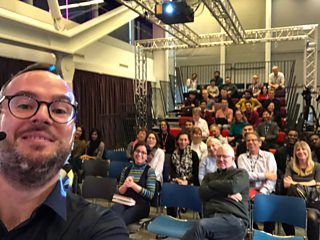This automated life
Jonathan Murphy
Technology & Creativity Blog editor
Sponsored by the Βι¶ΉΤΌΕΔ Academy, Fusion is a programme of events with the aim of bringing creativity and technology together. The team hosts regular lunchtime presentations on new trends in technology and this week they invited Gianfranco Chicco from the Webby Awards to talk about Artificial Intelligence.
The are one of the ultimate accolades in the world of digital - the web Oscars if you like...so the organisers should know a thing or two about digital trends, and at the moment they're turning their attention to the world of AI. In a very entertaining presentation called "This Automated Life", Gian Chicco, their European Marketing Director, took us through some of the pros and cons of this emerging technology.
"AI is one of the things we're seeing more and more...we wanted to understand better what's going on so we commissioned research with consumers to understand their concerns and their interests. It's certainly shaping how digital is operating," Chicco says.

Gianfranco Chicco with his AI audience
Partnering with Yougov Omnibus, they surveyed 3,400 adults (18-65) in the US about current usage patterns around AI as well as hopes and fears for its future. The results are fascinating.
- 65% of respondents said that AI had a significant daily impact on their lives, while 79% said they had used it in the last 12 months.
But the examples they cite are what's referred to as basic AI such as:
- GPS traffic navigation
- Film and TV recommendations
- Online Shopping
But Chicco points out that AI is far more pervasive than this - pointing to Facebook algorithms, online recruitment tools, financial trading and even medical diagnosis. Recently one US hospital used AI to analyse chest x-rays and had a 96% success rate in diagnosing TB.
But trust for more complicated decision-making is still low. The overwhelming majority of respondents still preferred to rely on humans to make medical or financial decisions, despite the risk of human error.
There are some, like the American billionaire and technophile Elon Musk, who see AI as a threat to humanity. While Chicco doesn't go that far he points out some of the darker sides:
- Facial recognition systems which can recognise protesters at rallies, even if they're in disguise
- Stock image pickers which re-inforce gender stereotypes - eg photos of women cooking
- A camera system in the Chinese city of Jinan which publically shames jaywalkers.

Jaywalkers beware
Actually the jay walking example was pretty funny. But there are plenty of examples which show AI's limits and why it's nowhere near taking over most human jobs. The robot security guard that drowned in a fountain or the image recongnition software that can't distinguish between dogs and muffins, for example.

Muffins or chihuahuas? Courtesy of www.crimesagainstai.com
Despite some of these drawbacks there is a good deal of optimism around AI.
- 80% of those surveyed think that self-driving deliveries will become routine within the next decade
- 64% even think it will be used to diagnose a medical condition
So while there's a growing acceptance that AI will become a bigger part of our lives, it's how it's used which is of interest to Chicco. As he puts it, technology is what we decide to do with it.
"This year in 2018, we'll be inquiring more about the morals and values behind it. Look at Fake News. It's nothing new, media manipulation has been around for ages, but now it can be done at scale and with reach through AI."
So perhaps it's not AI that we should fear, but the humans behind it.
